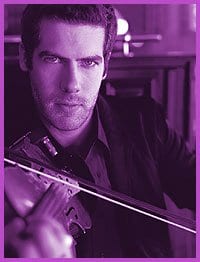Ashley MacIsaac scoffs at the suggestion that his much-anticipated new autobiography, Fiddling With Disaster, is a chance to set the record straight.
“I’m not setting the record straight ’cause most things that are out there are pretty straightforward,” he explains when asked about his motivations for writing. “There’s nothing straight about me. I’m fairly, overtly, openly, somewhat indestructibly gay, and when the opportunity to write an autobiography at 26 came up I was like, ‘What the hell do I got to talk about at 26? I’m not even finished my music career.'”
But many readers will likely pick up the book, out in April, to see if MacIsaac talks about the many controversies in his past.
The Cape Breton fiddler, now 28, is probably the most unruly Canadian celebrity of the last 10 years. Since his triple platinum 1995 debut album, Hi How Are You Today, MacIsaac has consistently provided the media with scores of stories about his sexual penchant for water sports and young boys, crack addiction, antagonistic public appearances and bankruptcy.
But MacIsaac has a few reasons to feel good these days. Along with the new book, he has a new CD, MacIsaac and MacIsaac, and is beginning a tour across North America, which will bring him to Barrymore’s on May 1.
Throughout our conversation, he exudes a typical east-coast charm, being completely un-stressed and talkative as he ruminates on his tumultuous life, and on Canadian politics and society.
“I don’t think I’m much of a danger-taker, and a lot of that’s explained in the book. I did have an addiction and I found myself in a lot of dangerous places and would not recommend that for anybody,” he says, referring to his days on cocaine.
On Canada’s political system, MacIsaac believes that Canada “isn’t as tolerant as it makes itself out to the public to be. Young gay kids who grow up in a Catholic community are assuming that it’s not right to be gay, that it’s better to have sex with a dog than be gay, and that goes on in our country because of straight, heterosexual, white male political views. That’s the truth, that’s the fact. Kids are being abused daily because of Canada’s political system.”
Curiously, MacIsaac said he had been considering a political career prior to his autobiography and recording, even telling the Foreign Minister that he wanted his job, but the events of Sep 11 ended those ambitions. MacIsaac was in Grand Central Station when the planes hit, and shortly after he fled to Cape Breton.
“I’m in New York and the first thing I told myself that day was, ‘You will never be a politician as long as you live.’ Within 10 hours I was back in Canada.”
Like the Twin Towers, MacIsaac’s life had crashed.
“I went to Cape Breton to figure out how I was going to feel fresh about making records knowing all the shit that I’ve listened to about myself,” he explains.
“I took the action of being completely open to a lot of things that other artists and people in the country may not have been so nationally open about,” said MacIsaac. “So yes, these things are true about myself, and I do like to smoke dope and I am gay. If you can’t handle it don’t buy my records and don’t read the book.”
And the future?
“The public has supported me and paid for me to be who I am, but if you want to be a rich celebrity don’t bother staying in Canada,” MacIsaac says frankly. “I’ll probably continue until I’m 30,” he says , basing his decision on the state of his bank account. “If I can’t make music my business in two years then I’m gonna fuckin’ open a car store.”

 Why you can trust Xtra
Why you can trust Xtra


